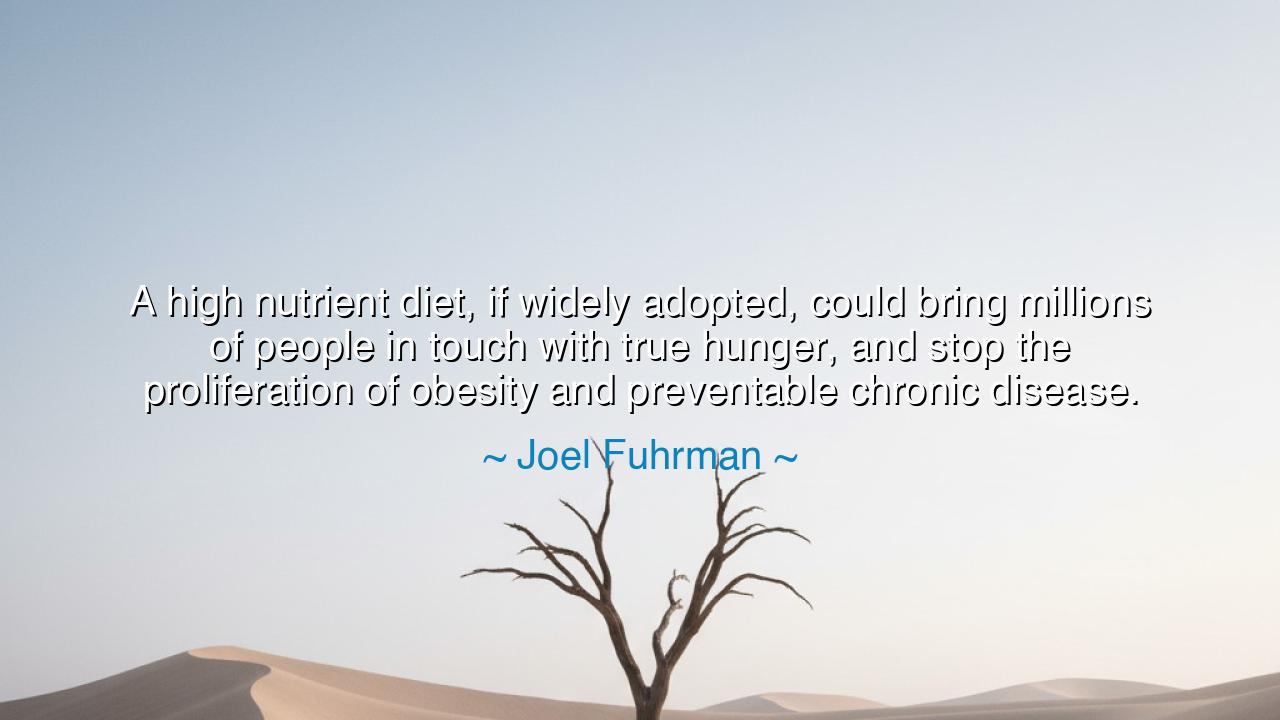
A high nutrient diet, if widely adopted, could bring millions of
A high nutrient diet, if widely adopted, could bring millions of people in touch with true hunger, and stop the proliferation of obesity and preventable chronic disease.






In the wise and stirring words of Joel Fuhrman, we hear a call to both reason and renewal: “A high nutrient diet, if widely adopted, could bring millions of people in touch with true hunger, and stop the proliferation of obesity and preventable chronic disease.” These words, though born of modern science, echo the moral teachings of the ancients—the reminder that the path to health is not a mystery, but a return to harmony. Fuhrman speaks not merely of diet, but of awakening, for he reminds us that we have forgotten the language of our own bodies.
To be “in touch with true hunger” is not only to understand the needs of the flesh, but to rediscover the sacred dialogue between man and nature. In the ancient world, before the rise of indulgence and excess, hunger was a guide, not a curse. The peasants who tilled the soil, the monks who lived on herbs and grains, the philosophers who ate simply and thought deeply—all knew that the purity of food shaped the purity of thought. They did not eat for pleasure alone, but for purpose. Yet in our age of abundance, we have confused appetite with hunger, and desire with need. We eat not to live, but to distract ourselves from living.
Fuhrman’s high nutrient diet—a way of eating centered on whole, plant-based foods—calls us back to balance. It is not a diet of deprivation, but of restoration. When one fills the body with what it was designed to receive—leaf and seed, fruit and grain—the fog begins to lift. The mind clears, the heart steadies, and the body remembers what it means to thrive. In ancient China, healers spoke of Chi, the life force that flows through all beings, strengthened by harmony and weakened by excess. Modern science now calls this balance homeostasis, but the truth is timeless: when we align our diet with nature’s order, we awaken the life within.
Consider the story of the Greek physician Asclepiades, who treated the sick not with heavy medicines, but with food, movement, and breath. He believed that most illness came not from fate, but from living against nature’s laws. When his patients followed his teachings—eating lightly, walking daily, and resting deeply—their ailments vanished like mist in the morning sun. So too does Fuhrman’s wisdom speak to us: that the epidemics of our age—obesity, diabetes, heart disease—are not curses, but consequences. And if they are born of our habits, they can be undone by our choices.
The proliferation of preventable chronic disease is the modern plague, yet its cure does not lie in the laboratories of man, but in the gardens of the earth. Our ancestors, who once feared famine, would be astonished to see a world dying not from scarcity, but from abundance. We are surrounded by food, yet starved of nourishment; full in body, yet empty in vitality. But when we eat as nature intended—plants rich in fiber, minerals, and antioxidants—we do not merely feed our bodies; we heal our future. For every person who turns to the soil for sustenance, another link in the chain of sickness is broken.
Fuhrman’s words also awaken a deeper truth: that the healing of the body is inseparable from the healing of the mind and soul. When we eat well, we live more consciously. When we live consciously, we grow in compassion. A high nutrient diet does more than prevent disease—it cultivates mindfulness, gratitude, and reverence for life. Each meal becomes an act of respect, a prayer of alignment with the natural world. To eat thus is to declare, “I will live in harmony with life, not in opposition to it.”
So, let this be the lesson passed to future generations: feed yourself as the earth intended. Seek foods that come from the ground, not from the factory. Let your hunger be your teacher—listen to it, and it will guide you toward truth. Choose what nourishes rather than what numbs, what sustains rather than what seduces. Remember that health is not found in the abundance of choice, but in the wisdom of restraint.
For in the end, Joel Fuhrman’s message is a prophecy of healing. If the world were to embrace the power of the high nutrient diet, we would not only conquer disease but rediscover our humanity. The veil of gluttony would fall, and true hunger—the hunger for life, for clarity, for wholeness—would awaken once more. And when that day comes, mankind will remember that health was never lost—it was simply waiting, in every seed and leaf, for us to return.






AAdministratorAdministrator
Welcome, honored guests. Please leave a comment, we will respond soon